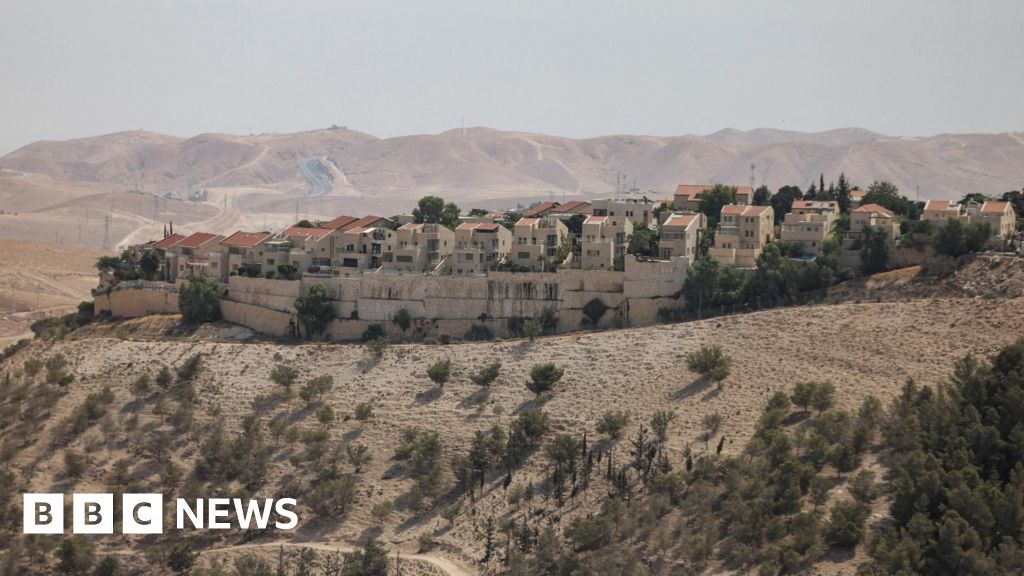UAE warns Israel that annexing West Bank would cross red line
- BBC News
The United Arab Emirates has warned Israel that annexing the occupied West Bank would cross a "red line" and undermine the spirit of the Abraham Accords that normalised relations between the two countries.
A senior Emirati official, Lana Nusseibeh, said such a move would be the death knell of the two-state solution to the Israeli-Palestinian conflict.
The Palestinian Authoritys foreign ministry said it welcomed the UAEs position.
The Israeli government has not commented. But Nusseibehs remarks came after far-right Finance Minister Bezalel Smotrich unveiled a proposal for the annexation of approximately four-fifths of the West Bank.
Israel has built about 160 settlements housing 700,000 Jews since it occupied the West Bank and East Jerusalem - land Palestinians want, along with Gaza, for a hoped-for future state - during the 1967 Middle East war. An estimated 3.3 million Palestinians live alongside them.
The settlements are illegal under international law.
The 2020 Abraham Accords, which were brokered by the US, saw the UAE, Bahrain and Morocco establish full diplomatic relations with Israel.
One of the UAEs key conditions for signing was that Israeli Prime Minister Benjamin Netanyahus previous government halt its plans to annex parts of the West Bank, including settlements and the Jordan Valley. Netanyahu said at the time that he had agreed to "suspend" the plans but that they remained "on the table".
Many ministers in his current right-wing and pro-settler governing coalition have long advocated annexing part or all of the West Bank. But they have reportedly been debating whether to advance such plans in response to recent announcements by the UK, France and a number of other countries that they intend to recognise the State of Palestine this month.
Netanyahu has said recognising statehood in the wake of the Hamass attack on Israel on 7 October 2023, which triggered the war in Gaza, would amount to "a reward for terrorism".
The UAE is one of the 147 UN member states which already recognise the State of Palestine.
"From the very beginning, we viewed the [Abraham] Accords as a way to enable our continued support for the Palestinian people and their legitimate aspiration for an independent state," said Nusseibeh, the UAE foreign ministrys assistant minister for political affairs.
She added: "Annexation in the West Bank would constitute a red line for the UAE.
"It would severely undermine the vision and spirit of [the] Accords, end the pursuit of regional integration and would alter the widely shared consensus on what the trajectory of this conflict should be - two states living side by side in peace, prosperity and security."
Hours earlier, Smotrich - an ultranationalist leader and settler who has control over planning in the West Bank - told a news conference in Jerusalem that "the time has come" for annexation.
"The idea of dividing the country and establishing a terrorist state at its centre must be put off the table once and for all," he added.
He presented a map that he said showed a proposal from the defence ministrys settlement administration for "applying Israeli sovereignty" to approximately 82% of the territory, which he said was in line with the principle of "maximum land with minimum Arabs".
The remaining 18% of the territory was made up of isolated enclaves around six Palestinian cities - Jenin, Tulkarm, Nablus, Ramallah, Jericho and Hebron.
Bethlehem was among the many other Palestinian cities, towns and villages not included, while East Jerusalem was already annexed by Israel in 1980, in a move not recognised by the vast majority of the international community.
Smotrich said Palestinians would "continue to manage their own lives, in the immediate future in the same way that this is done today through the Palestinian Authority, and later through regional civilian management alternatives".
The PA, which governs areas of the West Bank not under full Israeli control, said Smotrichs plan constituted a "direct threat" to hopes for a Palestinian state.
Yehuda Shaul of the Ofek Centre, a think tank which campaigns to end Israels occupation, reposted Smotrichs map on X and wrote: "Reminds me of another map in a different continent, from the 20th Century. There is a word in Afrikaans to describe that regime."
A number of international human rights groups have concluded that Israel is already operating an apartheid system in the West Bank - a characterisation that the Israeli government has rejected.
Last month, there was a wave of international outrage after the Israeli government approved plans unveiled by Smotrich for a major settlement project in the E1 area, which would effectively cut off the West Bank from East Jerusalem and divide the territory in two.
In 2024, the International Court of Justice issued an advisory opinion saying that Israels "continued presence in the Occupied Palestinian Territory is unlawful" and that the country was "under an obligation to bring to an end its unlawful presence... as rapidly as possible".
Netanyahu said at the time that the court had made a "decision of lies".